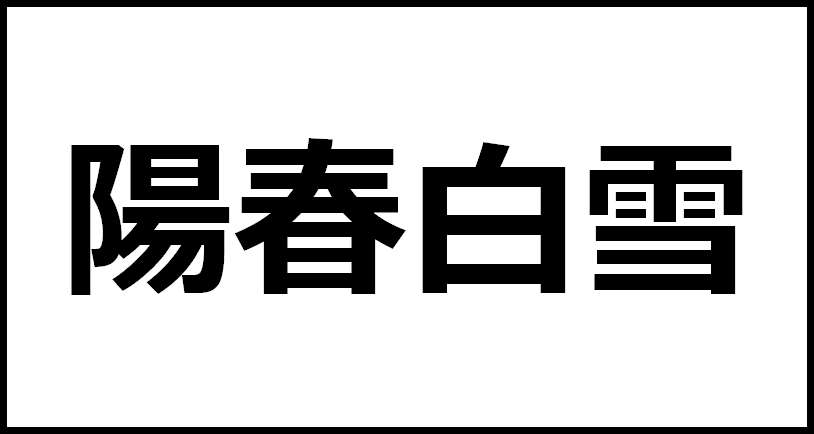陽春白雪について。四字熟語の陽春白雪の読み方や意味、英語や外国語での意味をまとめました。
陽春白雪について
陽春白雪の読み方・意味
| 四字熟語 | 陽春白雪 |
| 読み方 | ようしゅんはくせつ |
| カタカナ読み | ヨウシュンハクセツ |
| ローマ字読み | yoshunhakusetsu |
| 読みの文字数 | 9文字読みの四字熟語 |
| 頭文字 | 「よ」から始まる四字熟語 |
| 構成する文字 | ・春 ・白 ・陽 ・雪 |
| 意味 | 高尚な歌は調子を合わせてともに歌える人が少ない。優れた言行を理解できる人は少ないことのたとえに用いる。 |
陽春白雪の意味(外国語)
陽春白雪の外国語での意味をまとめました。
| 英語 | There are few people who can sing a noble song together in tune. It is used as an analogy of the fact that few people understand good words and deeds. |
| スペイン語 | Hay pocas personas que pueden cantar juntas una canción noble en sintonía. Se usa como una analogía del hecho de que pocas personas entienden las buenas palabras y las buenas acciones. |
| イタリア語 | Ci sono poche persone che sanno cantare insieme una canzone nobile intonata. È usato come analogia del fatto che poche persone capiscono buone parole e azioni. |
| ポルトガル語 | São poucas as pessoas que conseguem cantar uma nobre canção em sintonia. É usado como uma analogia do fato de que poucas pessoas entendem boas palavras e ações. |
| フランス語 | Ci sono poche persone che sanno cantare insieme una canzone nobile intonata. È usato come analogia del fatto che poche persone capiscono buone parole e azioni. |
| 中国語 | 很少有人能合唱一首高尚的歌曲。 比喻善言善行的人少。 |
| 韓国語 | 고상한 노래는 상태를 맞추어 함께 노래할 수 있는 사람이 적다. 뛰어난 언행을 이해할 수 있는 사람은 적은 것의 비유에 사용한다. |


